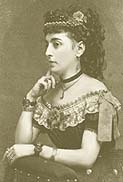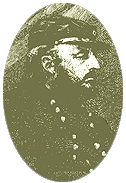
|
From
the Diary of Clara Solomon:
Orders
Issued by General Butler
|
|

|
In
this journal entry, Clara writes of general orders 28, 29, and 30—issued
to the citizens of New Orleans by Major General Benjamin Butler during
the Union Army's occupation—and of her reaction to these orders.

Saturday,
May 17th, 1862
6 ¾ A.M. I have been up for some time, & in obedience to
A.'s [my elder sister Alice's] orders, the Paper was brought to her,
& the general orders No.29 & 30 [issued by Union Major General
Benjamin Butler] were so unexpected & startling that they completely
unnerved me, & I was unable to continue my toilette. I was not quite
right in saying that they were unexpected for do we place any reliance
on the word of that unprincipled Butler?
Order No.29, "On the 27th day of May, all circulation of or trade
in Con. [Confederate] notes & bills will cease within this department,
& all sales or transfers made on that day will be void, & the
property confiscated to the U.S."!! Now, how terrible a blow is
this. The greater part of the money now in circulation is the Con. notes,
& the loss to many will be enormous. None, I presume, will now be
received in payment & what substitute are we to have. The "Wretch"
[Butler] said in his proclamation that he would allow them as a legal
tender, & see how he has violated his word. I have no doubt but
it will produce a great commotion in the city & why shouldn't it,
when it will involve the ruin of thousands.
 General
order No.30. The N.O. Delta [New Orleans Delta newspaper] having
published in today's issue, an article discussing the cotton question
in a manner which violates the terms of the Proclamation, from these
headquarters, the office of that paper the office of that paper will
be taken possession of & its business conducted under direction
of the U.S. authorities…. The continuation of the order is,
"The N.O. Bee, having published an elaborate though covert article
in favor of the burning of the cotton & the mob, is hereby suppressed.
No publication of any kind will issue from that paper until further
orders"…. General
order No.30. The N.O. Delta [New Orleans Delta newspaper] having
published in today's issue, an article discussing the cotton question
in a manner which violates the terms of the Proclamation, from these
headquarters, the office of that paper the office of that paper will
be taken possession of & its business conducted under direction
of the U.S. authorities…. The continuation of the order is,
"The N.O. Bee, having published an elaborate though covert article
in favor of the burning of the cotton & the mob, is hereby suppressed.
No publication of any kind will issue from that paper until further
orders"….
The taking of this city & the burning of our cotton will be the
making of our Confederacy, for it will show the foreign nations that
we are in earnest & willing to make any sacrifices, that
we are a brave determined people imbued with the same spirit as were
those 13 little colonies who triumphed over the greatest nation on earth.
There were gloomier days than this during the Revolution, for says a
London paper, "the capture of Charleston or N.O. itself would,
if the Southerners intend to hold out, be but the commencement of the
war. Let it be remembered that we took all these cities & Boston
& N.Y besides during the war of Independence. We had nothing to
conquer but the Atlantic coast & we found after a fair trial that
it was impossible. It was not so much the volunteers as the country
which beat us. We had a much more desperate battle & a much more
glorious success at Bunker Hill, than the Fed. had at Fort Donelson
but it had little value towards the conquest of Massachusetts".
This seems as though they were decidedly in our favor….
The weather is at present fine, but yesterday we had a touch of summer
& we again realize that this house is not adopted to that season.
It is a very unpleasant summer residence & had things been different
it was Ma's intention to move [to another residence], but can we now
think of such a thing, unsettled as we feel. I declare I, & in fact
we, are so foolish. When the bell rings all kind of antics are practised,
& I dread to ask who it is, fearing that the response will not be
"Pa". Oh! ye minds! waft to us some tidings of him….
…[Yesterday] afternoon A. [Alice] & I made up our minds to
go to Mrs. Caulfield, so we made our most elaborate toilettes for that
purpose & by 6 ¼ left our abode. A pleasant walk of a few
minutes brought us in sight of her residence, & we espied the "venus"
standing on her gallery. She ran down to greet us, & said that she
was so happy to see us. She looked very pretty & as I gazed
upon her I did not wonder that the title of the "prettiest lady
in N.O." had been awarded to her. But—she is not my style.
Oh! for the "golden hair & eyes of heaven's own blue"!
She had a great deal to say as all have at these times & you can
imagine the general topic. The house next to her is unoccupied &
cheap & she is so desirous for Ma to take it. I don't know if I
should be pleased, for you know "Too much familiarity", etc.
Several of the d--m wretches [soldiers] passed, some in carriages &
some on horseback. Oh! that—I could have had [at] them. Ma's strict
orders were that we should be home before dark & for fear of being
prohibited in the street, at all, we left early….
When I arrived in School [today], I noticed an unusual stir & commotion
& when I inquired the cause, there was some astonishment expressed
that I had not heard the news, the General order, No.28. I was informed
of it & when Miss B. came she read it. "Be silent that you
may hear. As the soldiers of the U.S. have been subject to insults offered
to them by the women (calling themselves ladies) of N.O., I hereby order
that should any female treat with contempt, or insult in word, gesture
or movement any officer & private under my command, she shall be
liable to be treated as a woman of the town, plying her avocation".
…I cannot express to you the indignation this thing awakened,
my feelings are akin to a lady, who speaking of the subject, said "I
cannot tell you how I feel or what I think". I hear that the men
were perfectly exasperated for you know the insult offered to us is
also to them. The cowardly wretches! to notice the insults of ladies!
But the news will get abroad & then we shall be praised for our
actions. They will see the spirit of our women, aged, even children,
but they dare not notice their insults. And how did they expect
to be treated. Can a woman, a Southern woman, come in contact with one
of them & allow her countenance to retain its wonted composure.
Will not the scornful feelings in our hearts there find utterance. They
may control our actions, but looks, they never can.
Nothing was thought of in school, but it, & there was also some
unusual excitement, as it is rumored that it is their intention to pay
a visit to the School, & they are daily looked for. The High School
was to be closed on the morrow [Jefferson Davis had ordered a fast day],
but I think it is injudicious to so totally disregard But.'s [Butler's]
orders. True, Davis is superior to him, but we, we are the captured
in a captive city & as servile to them as is the slave to his master.
Oh! how long will, can this state of things exist?….
Went over to Mrs. N. [Sarah Nathan], Mr. N. [Sammy Nathan of the Crescent
Artillery] very much enraged, so much so, that he determined to say
nothing. A long argument & discussion was kept up, upon patriotism,
the different ways of showing it, etc., etc….
No one came at night & after the usual programme retired. Endeavored
to kill as few mosquitoes as possible. For two reasons, the first being
that we should be polluted by being touched by "Yankee blood",
& secondly each one increases the number & aids in biting &
tormenting them. I wonder how they like them! Oh! ever & anon come
thoughts, come gentle thoughts of the poor Delta.
The Civil War
Diary of Clara Solomon: Growing Up in New Orleans, 1861-1862, edited
by Elliott Ashkenazi, Louisiana State University Press, Baton Rouge,
LA, 1995, pp. 367-370.
Images: Clara Solomon care of Alice Dale Cohan; Major General Benjamin
Butler, by Mathew Brady Studio, circa 1864 (National Portrait Gallery,
Smithsonian Institution).

Solomon
Index | Previous
Page | Next Page
Back | Home
Copyright © 2003 1st
Dragoon's Civil War Site. All rights reserved.
Spider
Map Index
|


 General
order No.30. The N.O. Delta [New Orleans Delta newspaper] having
published in today's issue, an article discussing the cotton question
in a manner which violates the terms of the Proclamation, from these
headquarters, the office of that paper the office of that paper will
be taken possession of & its business conducted under direction
of the U.S. authorities…. The continuation of the order is,
"The N.O. Bee, having published an elaborate though covert article
in favor of the burning of the cotton & the mob, is hereby suppressed.
No publication of any kind will issue from that paper until further
orders"….
General
order No.30. The N.O. Delta [New Orleans Delta newspaper] having
published in today's issue, an article discussing the cotton question
in a manner which violates the terms of the Proclamation, from these
headquarters, the office of that paper the office of that paper will
be taken possession of & its business conducted under direction
of the U.S. authorities…. The continuation of the order is,
"The N.O. Bee, having published an elaborate though covert article
in favor of the burning of the cotton & the mob, is hereby suppressed.
No publication of any kind will issue from that paper until further
orders"….